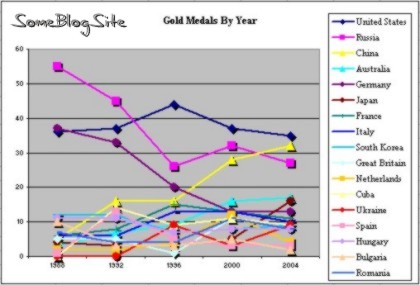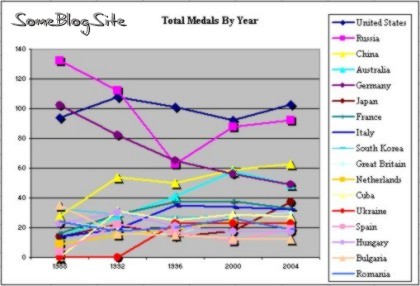Since there is some debate about the best way to measure who won the Olympics (correct answer: “We all did”), I thought I would prepare the results using several different methods so that various countries could claim to be the winners.
Most of the debate, at least here in the USA, centers around do only golds count (China won) or do all medals count (USA won). The seemingly official method is to count by golds, but there are some other ways.
Since there are too much data to put into one post, I’ll summarize the results in this post and also point to another page that contains the unsummarized data.
Summary: Panama or India won the 2008 Olympic games
| Country
| Athletes / Gold
| Rank
|
| Panama PAN |
6.0 |
1 |
| China CHN |
12.5 |
2 |
| Jamaica JAM |
14.8 |
3 |
If the official ranking is by gold medals won, the ranking should be normalized by how many athletes competed to get those golds. Some other methods are to adjust the ranking by the countries’ GDP, population, or area.
A country’s economic ranking (by GDP) is the best indicator of how well that country will do in the Olympics. Of the top ten Olympic gold winners, eight of them were in the top ten GDPs. The other two winners were still in the top twenty GDPs.
But I prefer to normalize the Olympic rankings by athletes or, as they are sometimes called, delegates. How many contestants did a country send to win medals? And how many medals did they win? It’s more of an efficiency rating, but I think it is better than comparing medals to the general population.
I also prefer to use a weighted ranking (gold = 5 points, silver = 3 points, bronze = 1 point) and rank the countries by points, not by gold medals and not by total medals. It is interesting to note that the ranking of countries by gold medal has the same result as ranking them by points. The points system provides a clearer picture of the order, as there are a number of countries that did not win a gold medal. If the ranking is by gold medal only, then those countries receive the same rank. A points system provides for finer resolution of the ranking.
When one adjusts the points total by number of athletes sent to the Olympics, India is the winner. They were the only country to earn more than one point per athlete or, as I ranked them, less than one athlete per point.
| Country
| Athletes / Point
| Rank
|
| India IND |
0.86 |
1 |
| Uzbekistan UZB |
1.14 |
2 |
| Cuba CUB |
1.65 |
3 |
For the complete data, please view the charts on the 2008 Olympics Results page.
Be diligent in these matters; give yourself wholly to them, so that everyone may see your progress
1 Timothy 4:15

 This is Alpha, the first-born, when he was 2YO.
This is Alpha, the first-born, when he was 2YO. This is Beta, the second-born, when he was about 2YO.
This is Beta, the second-born, when he was about 2YO. This is Gamma, the third-born, when he was about 18MO.
This is Gamma, the third-born, when he was about 18MO.





